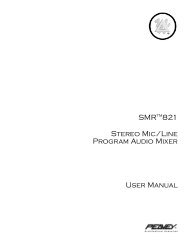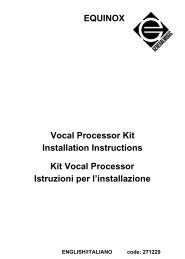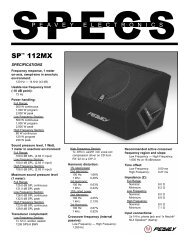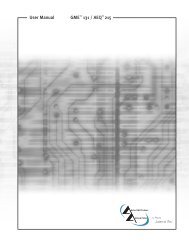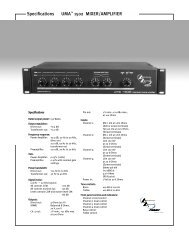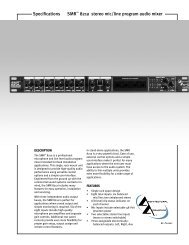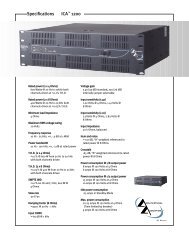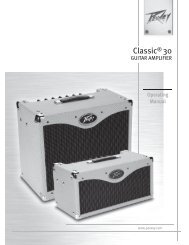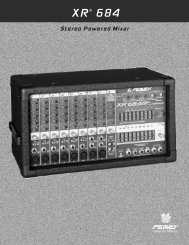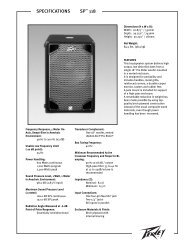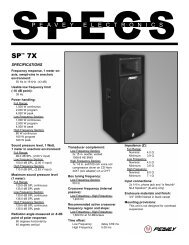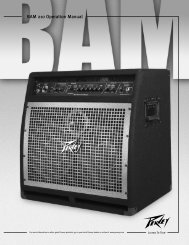Create successful ePaper yourself
Turn your PDF publications into a flip-book with our unique Google optimized e-Paper software.
<strong>KB</strong>/A <strong>30</strong><br />
KEYBOARD/ACOUSTIC<br />
AMPLIFIER<br />
OPERATING GUIDE<br />
R
Intended to alert the user to the presence of uninsulated “dangerous voltage” within the product’s<br />
enclosure that may be of sufficient magnitude to constitute a risk of electric shock to persons.<br />
Intended to alert the user of the presence of important operating and maintenance (servicing)<br />
instructions in the literature ac<strong>com</strong>panying the product.<br />
CAUTION: Risk of electrical shock — DO NOT OPEN!<br />
CAUTION: To reduce the risk of electric shock, do not remove cover. No user serviceable parts inside. Refer<br />
servicing to qualified service personnel.<br />
WARNING: To prevent electrical shock or fire hazard, do not expose this appliance to rain or moisture. Before<br />
using this appliance, read the operating guide for further warnings.<br />
Este símbolo tiene el propósito, de alertar al usuario de la presencia de “(voltaje) peligroso” que no tiene<br />
aislamiento dentro de la caja del producto que puede tener una magnitud suficiente <strong>com</strong>o para constituir<br />
riesgo de corrientazo.<br />
Este símbolo tiene el propósito de alertar al usario de la presencia de instruccones importantes sobre la<br />
operación y mantenimiento en la literatura que viene con el producto.<br />
PRECAUCION: Riesgo de corrientazo — No abra.<br />
PRECAUCION: Para disminuír el riesgo de corrientazo, no abra la cubierta. No hay piezas adentro que el usario<br />
pueda reparar. Deje todo mantenimiento a los técnicos calificados.<br />
ADVERTENCIA: Para evitar corrientazos o peligro de incendio, no deje expuesto a la lluvia o humedad este<br />
aparato Antes de usar este aparato, Iea más advertencias en la guía de operación.<br />
Ce symbole est utilisé pur indiquer à l’utilisateur la présence à l’intérieur de ce produit de tension nonisolée<br />
dangereuse pouvant être d’intensité suffisante pour constituer un risque de choc électrique.<br />
Ce symbole est utilisé pour indiquer à l’utilisateur qu’il ou qu’elle trouvera d’importantes instructions sur<br />
l’utilisation et l’entretien (service) de l’appareil dans la littérature ac<strong>com</strong>pagnant le produit.<br />
ATTENTION: Risques de choc électrique — NE PAS OUVRIR!<br />
ATTENTION: Afin de réduire le risque de choc électrique, ne pas enlever le couvercle. Il ne se trouve à l’intérieur<br />
aucune pièce pouvant être reparée par l’utilisateur. Confier I’entretien à un personnel qualifié.<br />
AVERTISSEMENT: Afin de prévenir les risques de décharge électrique ou de feu, n’exposez pas cet appareil à la<br />
pluie ou à l’humidité. Avant d’utiliser cet appareil, lisez les avertissements supplémentaires situés dans le guide.<br />
Dieses Symbol soll den Anwender vor unisolierten gefährlichen Spannungen innerhalb des Gehäuses<br />
warnen, die von Ausreichender Stärke sind, um einen elektrischen Schlag verursachen zu können.<br />
Dieses Symbol soll den Benutzer auf wichtige Instruktionen in der Bedienungsanleitung aufmerksam<br />
machen, die Handhabung und Wartung des Produkts betreffen.<br />
VORSICHT: Risiko — Elektrischer Schlag! Nicht öffnen!<br />
VORSICHT: Um das Risiko eines elektrischen Schlages zu vermeiden, nicht die Abdeckung enfernen. Es befinden<br />
sich keine Teile darin, die vom Anwender repariert werden könnten. Reparaturen nur von qualifiziertem<br />
Fachpersonal durchführen lassen.<br />
ACHTUNG: Um einen elektrischen Schlag oder Feuergefahr zu vermeiden, sollte dieses Gerät nicht dem Regen<br />
oder Feuchtigkeit ausgesetzt werden. Vor Inbetriebnahme unbedingt die Bedienungsanleitung lesen.<br />
2
ENGLISH<br />
<strong>KB</strong>/A <strong>30</strong><br />
Full-Range Biamped Combo<br />
When you’ve got to have it all in a portable, high-powered, full-range amplifier — the <strong>KB</strong>/A <strong>30</strong> is it!<br />
This amp provides the perfect <strong>com</strong>bination of size, power and features, and is the latest edition to<br />
<strong>Peavey</strong>’s popular <strong>KB</strong>/A line of amplifiers.<br />
MOBILITY<br />
The <strong>KB</strong>/A <strong>30</strong> is <strong>com</strong>pact enough to fit in the tightest locations and weighs only 34.3 pounds.<br />
FULL RANGE SOUND<br />
The <strong>KB</strong>/A <strong>30</strong> offers a special two-way coax speaker system featuring a 10" woofer with a 1"<br />
ferro fluid <strong>com</strong>pression tweeter for exceptional full-range output. The coax design provides the<br />
advantages of a point source system, therefore when you move your head, the center point<br />
doesn’t change. The dome tweeter provides a clean extended response that is extremely smooth.<br />
The <strong>KB</strong>/A <strong>30</strong> cabinet, borrowed from our bass division, offers an isolated, sealed enclosure which<br />
provides optimum bass response.<br />
BIAMPLIFICATION EXPONENTIALLY INCREASES OUTPUT<br />
Unlike any other <strong>com</strong>bo in its class, the <strong>KB</strong>/A <strong>30</strong> is biamped, which provides dedicated power amps<br />
to both the woofer and tweeter. Biamping greatly increases the sound output as the amplifiers work<br />
much more efficiently. The signal passes through a specially-designed electronic crossover which<br />
feeds the two amplifiers. A 40-watt amp powers the woofer, and a dedicated 10-watt amp powers<br />
the tweeter. Biamping greatly increases the available headroom and enables the <strong>KB</strong>/A <strong>30</strong> sound output<br />
to go beyond what you would expect.<br />
FOUR INPUTS<br />
Channel one is optimized for mic or line input (XLR <strong>com</strong>bo input) and features two-band EQ.<br />
Channel two is optimized for line or acoustic inputs and features a gain switch to better handle<br />
acoustic inputs in addition to the two-band EQ. Channel three is a dedicated line/instrument input<br />
and features two-band EQ. A fourth channel is located on the rear panel and offers a monitor input.<br />
This signal passes only to the amp and is not part of the line output signal. This is handy for click<br />
tracks or other monitoring. You could even have the console monitor signal fed to the amp through<br />
this input giving the <strong>KB</strong>/A <strong>30</strong> a dual function. An effects insert (send/return) is also provided for<br />
adding your favorite EFX device to the master signal. The variety of inputs provided on the <strong>KB</strong>/A <strong>30</strong><br />
make it a versatile power packed system.<br />
OUTPUTS<br />
The <strong>KB</strong>/A <strong>30</strong> offers an XLR balanced line output in addition to a 1/4" effects send jack that can<br />
function as a direct output. Also, the all-important headphone output is placed on the front for easy<br />
access. When the headphone is used, the amplifier signal is automatically muted.<br />
3
MORE...<br />
This amp provides the perfect <strong>com</strong>bination of size, power, and features. With excellent sound, roadworthy<br />
design, and unmatched reliability, the <strong>KB</strong>/A <strong>30</strong> is the amplification choice for your keyboard,<br />
acoustic guitar, and vocal applications.<br />
And don’t forget ... with every <strong>KB</strong>/A series amplifier, you get <strong>Peavey</strong>’s excellent warranty and the<br />
best in support from its award-winning service department.<br />
FRONT PANEL<br />
1<br />
3 4 5 6 7 9 10 11 12 13 14 15 16<br />
2 8<br />
CHANNEL ONE<br />
1. LOW-Z INPUT<br />
For use with low-impedance microphones or low level sources equipped with a male XLR<br />
connector.<br />
2. HIGH-Z INPUT<br />
For use with high-impedance microphones or high level sources equipped with a 1/4" phone<br />
plug.<br />
3. GAIN CONTROL<br />
Controls the channel one input level.<br />
4. LOW EQ<br />
An active tone control (shelving type, ±15 dB) that varies the low-frequency range.<br />
CAUTION: Excessive low-frequency boost causes greater power consumption and<br />
increases possibility of speaker damage.<br />
5. HIGH EQ<br />
An active tone control (shelving type, ±15 dB) that varies the high-frequency range.<br />
CHANNEL TWO<br />
6. HIGH-Z INPUT<br />
A 1/4" phone jack input is provided with extremely wide dynamic range. This input will accept<br />
very high level signals generated by synthesized keyboard systems or very low signals<br />
generated by practice or home keyboard units.<br />
4
7. LEVEL CONTROL<br />
Controls the channel two 1/4" phone jack input level.<br />
8. GAIN SWITCH<br />
Boosts the gain of its channel by 12 dB. Depress to the “in” position to activate.<br />
9. LOW EQ<br />
An active tone control (shelving type, ±15 dB) that varies the low-frequency range.<br />
CAUTION: Excessive low frequency boost causes greater power consumption and increases<br />
possibility of speaker damage.<br />
10.HIGH EQ<br />
An active tone control (shelving type, ±15 dB) that varies the high-frequency range.<br />
CHANNEL THREE<br />
11. HIGH-Z INPUT<br />
A 1/4" phone jack input is provided with extremely wide dynamic range. This input will accept<br />
very high level signals generated by synthesized keyboard systems or very low signals<br />
generated by practice or home keyboard units.<br />
12.LEVEL CONTROL<br />
Controls the channel three 1/4" phone jack input level.<br />
13.LOW EQ<br />
An active tone control (shelving type, ±15 dB) that varies the low-frequency range.<br />
CAUTION: Excessive low-frequency boost causes greater power consumption and<br />
increases possibility of speaker damage.<br />
14.HIGH EQ<br />
An active tone control (shelving type, ±15 dB) that varies the high-frequency range.<br />
15.POWER LED (RED)<br />
The red power LED will illuminate when AC power is being supplied to the amp.<br />
16.HEADPHONE JACK<br />
A stereo jack is provided in order to allow the signal to flow to each side of any stereo headset.<br />
When a stereo headset is plugged in, the internal speaker is automatically turned off so that a<br />
totally private rehearsal situation can be ac<strong>com</strong>plished. NOTE: The headphone system will not<br />
work with headsets that have a mono phone plug.<br />
5
REAR PANEL<br />
21 17<br />
18 19<br />
20<br />
17.LINE OUT<br />
Balanced XLR output can be used to route signals to a mixing console, tape recorded, etc.<br />
18.EFFECTS PATCH<br />
A stereo out/in jack allows the use of various auxiliary units (chorus, flanging, tape/digital/analog<br />
delays, equalizers, etc.) in line before the power amp section. To utilize this system, a stereo plug<br />
(tip/ring/sleeve) to a “Y” cord must be used. The tip portion of the 1/4" stereo jack serves as the<br />
signal send (output) while the ring portion will return the processed signal to the system. The<br />
sleeve portion serves as the ground.<br />
Since this is a stereo jack configuration, the first click on the jack may be used as a pre power<br />
amp output with a mono 1/4" plug if desired. This first click will not disturb the signal flow to the<br />
remainder of the system as it is fed into the power amp section. NOTE: If the second click of the<br />
out/in jack is utilized without returning any signal to the system from an effects device the power<br />
amp will be disabled.<br />
CHANNEL FOUR<br />
19.MONITOR LEVEL<br />
Controls the channel four 1/4" phone jack input level.<br />
22<br />
20.MONITOR INPUT<br />
A 1/4" phone jack input is provided to be used as a monitor input. This signal does not route to<br />
the line output.<br />
21.POWER SWITCH<br />
Depress the switch to the “on” position. The red pilot light (LED) will illuminate indicating power is<br />
being supplied to the unit.<br />
22.(120V PRODUCTS ONLY)<br />
For your safety, we have incorporated a three-wire line (mains) cable with proper grounding<br />
facilities. It is not advisable to remove the ground pin under any circumstances. If it is<br />
necessary to use the equipment without proper grounding facilities, suitable grounding<br />
adapters should be used. Less noise and greatly reduced shock hazard exists when the unit<br />
is operated with the proper grounded receptacles.<br />
6
<strong>KB</strong>/A <strong>30</strong> SPECIFICATIONS<br />
PREAMP SECTION<br />
The following preamp specs are measured at 1 kHz<br />
with the master EQ set flat at 0 dB, all gain switches<br />
in the out position, nominal signal levels are with<br />
channel level controls set at five. Minimum levels are<br />
with channel level controls set at 10.<br />
CHANNEL ONE INPUTS<br />
Low-Z Input Impedance: 5k ohms<br />
Nominal input Level: -<strong>30</strong> dBV, 32 mV RMS<br />
Minimum input Level: -40 dBV, 10 mV RMS<br />
High-Z Input Impedance: 5k ohms<br />
Nominal input level: -<strong>30</strong> dBV, 32 mV RMS<br />
Minimum input level: -40 dBV, 10 mV RMS<br />
CHANNEL TWO and CHANNEL THREE INPUTS<br />
Input impedance: 22k ohms<br />
Nominal input level: -21 dBV, 90 mV RMS<br />
Minimum input level: -40 dBV, 10 mV RMS<br />
CHANNEL FOUR INPUT<br />
Input impedance: 10k ohms<br />
Nominal input level: 0 dBV, 1 V RMS<br />
Minimum input level: -25 dBV, 56 mV RMS<br />
EFFECTS PATCH : (STEREO JACK TIP)<br />
Function: Low level effects send<br />
Load impedance: 1k ohms or greater<br />
Nominal output: -10 dBV, 316 mV RMS<br />
PRE EQ PATCH: (STEREO JACK RING)<br />
Function: Low level effects return<br />
Impedance: High-Z, 10k ohms<br />
Input level: -10 dBV, 316 mV RMS<br />
(Switching stereo jack provides patch output to patch<br />
input connection when not used.)<br />
LINE OUTPUT:<br />
Function: High level signal send<br />
Load impedance: 100 ohms or greater<br />
Nominal output: -6 dBV, 0.5V RMS<br />
Maximum output: 18 dBV, 8V RMS<br />
(XLR pin 2 positive/pin 3 negative)<br />
HEADPHONE OUTPUT: (STEREO JACK)<br />
Load impedance: 8 ohms or greater<br />
Nominal output: 100 mW<br />
(Switching jack will disconnect internal speaker when<br />
headphone plug is inserted.)<br />
The following specs measured at nominal<br />
setting, all phone jack inputs terminated with<br />
47k ohms.<br />
FREQUENCY RESPONSE<br />
(Channel input/preamp output at 1 V RMS level)<br />
+0, -3 dB, 20 Hz to 20 kHz<br />
PREAMP DISTORTION<br />
(Channel in/preamp out, 20 Hz to 20 kHz at<br />
1 V RMS)<br />
Less than .05% THD, typically below .01%<br />
PREAMP HUM AND NOISE<br />
Greater than -95 dBV<br />
CHANNEL EQUALIZATION<br />
±15 dB at 80 Hz and 10 kHz, shelving<br />
POWER AMPLIFIER SECTION<br />
POWER AT CLIPPING (TYPICALLY)<br />
40 W RMS into 8 ohms/low channel<br />
10 W RMS into 8 ohms/high channel<br />
(Both channels driven, 5% THD, 3.5 kHz,<br />
120 V AC Line)<br />
TOTAL HARMONIC DISTORTION<br />
Less than 0.3%, <strong>30</strong> W RMS/low<br />
channel into 8 ohms, 50 Hz to 2 kHz<br />
Less than 0.3%, 7 W RMS/high<br />
channel into 8 ohms, 5 kHz to 20 kHz<br />
(Typically below 0.2%)<br />
FREQUENCY RESPONSE<br />
+0,-1 dB, @ <strong>30</strong> W RMS/low channel into<br />
8 ohms, 50 Hz to 2 kHz<br />
+0,-1 dB, @ 7 W RMS/high channel into<br />
8 ohms, 5 kHz to 20 kHz<br />
HUM and NOISE<br />
Greater than 90 dB below rated power<br />
POWER CONSUMPTION (DOMESTIC)<br />
100 W at 120 V AC, 50/60 Hz<br />
CROSSOVER<br />
Fixed, 18 dB/octave, 3.5 kHz crossover<br />
frequency<br />
ALL SPECIFICATIONS SUBJECT TO CHANGE WITHOUT NOTICE.<br />
7
ESPAÑOL<br />
<strong>KB</strong>/A <strong>30</strong><br />
Biamplificador <strong>com</strong>binado de banda ancha<br />
Si usted dispone de todo que necesita en un amplificador portátil de alta potencia y banda ancha,<br />
¡tiene un biamplificador <strong>com</strong>binado <strong>KB</strong>/A <strong>30</strong>! Este amplificador ofrece la <strong>com</strong>binación perfecta de<br />
tamaño, potencia y funciones. Además, es la última novedad en la renombrada línea de<br />
amplificadores <strong>KB</strong>/A de <strong>Peavey</strong>.<br />
MOVILIDAD<br />
El biamplificador <strong>com</strong>binado <strong>KB</strong>/A <strong>30</strong> es suficientemente <strong>com</strong>pacto <strong>com</strong>o ser instalado en los<br />
lugares más estrechos y sólo pesa 15,5 kg.<br />
SONIDO DE BANDA ANCHA<br />
El biamplificador <strong>com</strong>binado <strong>KB</strong>/A <strong>30</strong> ofrece un sistema especial de altavoces bidireccionales<br />
coaxiles con un altavoz de graves (woofer) de 10 pulg. y un altavoz de agudos (tweeter) de 1 pulg.<br />
con <strong>com</strong>presión y núcleo de fluido ferroso que permiten alcanzar una excepcional salida de banda<br />
ancha. El diseño coaxil ofrece las ventajas de un sistema de origen puntual por lo que, al girar la<br />
cabeza, el punto central no cambia de posición. El altavoz de agudos de forma convexa brinda un<br />
sonido de respuesta extendido y limpio que es extremadamente homogéneo.<br />
El diseño del gabinete de este biamplificador <strong>com</strong>binado <strong>KB</strong>/A <strong>30</strong>, diseñado por nuestra división de<br />
altavoces para graves, ofrece una caja acústica aislada y sellada que brinda una respuesta óptima<br />
de sonidos bajos.<br />
LA BIAMPLIFICACIÓN AUMENTA EL VOLUMEN EN FORMA EXPONENCIAL<br />
A diferencia de cualquier otro biamplificador <strong>com</strong>binado de su clase, el <strong>KB</strong>/A <strong>30</strong> es biamplificado, lo<br />
que le significa que cuenta con amplificadores de potencia dedicados, tanto para el altavoz de<br />
graves <strong>com</strong>o para el de agudos. La biamplificación aumenta considerablemente el volumen del<br />
sonido debido a que el funcionamiento con dos amplificadores es mucho más eficiente. La señal<br />
pasa por un punto de entrecruzamiento electrónico de diseño especial que alimenta ambos<br />
amplificadores. El altavoz de graves recibe alimentación de un amplificador de 40 W y el altavoz de<br />
agudos de un amplificador dedicado de 10 W. La biamplificación multiplica la tolerancia de máximo<br />
nivel de señal disponible y permite que la salida de sonido del biamplificador <strong>com</strong>binado <strong>KB</strong>/A <strong>30</strong><br />
exceda todas las expectativas.<br />
CUATRO ENTRADAS<br />
El canal uno está optimizado para una entrada de micrófono o de línea (entrada <strong>com</strong>binada XLR) y<br />
ofrece ecualización de dos bandas. El canal dos está optimizado para entradas de línea o señales<br />
acústicas y tiene un conmutador de ganancia que posibilita un mejor manejo de las señales acústicas,<br />
además de ofrecer ecualización de dos bandas. El canal tres es una entrada dedicada de línea<br />
o instrumento que también ofrece ecualización de dos bandas. El cuarto canal se encuentra en el<br />
panel posterior y ofrece una entrada para monitor. Esta señal pasa sólo al amplificador y no forma<br />
parte de la señal de salida de línea. Resulta de utilidad para seleccionar pistas o realizar otras<br />
operaciones de monitoreo. Asimismo, es posible hacer que la señal del monitor de la consola sea<br />
enviada al amplificador a través de esta entrada, para obtener una doble función del biamplificador<br />
<strong>com</strong>binado <strong>KB</strong>/A <strong>30</strong>. También se ofrece una inserción de efectos (señal de muestra/retorno) para<br />
procesar la señal de control maestro con el dispositivo de efectos especiales que usted prefiera. La<br />
8
diversidad de entradas del biamplificador <strong>com</strong>binado <strong>KB</strong>/A <strong>30</strong> lo convierten en un sistema versátil y<br />
poderoso.<br />
SALIDAS<br />
El biamplificador <strong>com</strong>binado <strong>KB</strong>/A <strong>30</strong> cuenta con una salida de línea balanceada XLR, además de<br />
un enchufe hembra de señal de muestra de efectos de 1/4 pulg., que también puede utilizarse para<br />
las salidas directas. La imprescindible salida para auriculares está situada en la parte frontal del<br />
biamplificador <strong>com</strong>binado, lo que permite acceder a ella con facilidad. La señal del amplificador se<br />
silencia automáticamente cuando se utilizan los auriculares.<br />
Y MUCHO MÁS…<br />
Este amplificador ofrece la <strong>com</strong>binación perfecta de tamaño, potencia y funciones. El excelente<br />
sonido, el diseño especial para viajes y la seguridad sin igual, hacen que el <strong>KB</strong>/A <strong>30</strong> sea el<br />
amplificador preferido para teclados, guitarras acústicas y aplicaciones de voz.<br />
No lo olvide: con cada amplificador de la serie <strong>KB</strong>/A, usted recibe la excelente garantía de <strong>Peavey</strong> y<br />
el mejor respaldo de su premiado departamento técnico.<br />
Consulte los diagramas del panel delantero en<br />
la sección de inglés de est manual.<br />
CANAL UNO<br />
1. ENTRADA DE BAJA IMPEDANCIA<br />
Para usar con micrófonos de baja impedancia o fuentes de bajo nivel equipadas con un<br />
conector macho XLR.<br />
2. ENTRADA DE ALTA IMPEDANCIA<br />
Para usar con micrófonos de alta impedancia o fuentes de alto nivel equipadas con enchufes<br />
hembra de tipo telefónico de 1/4 pulg.<br />
3. CONTROL DE GANANCIA<br />
Controla el nivel de la entrada del canal uno.<br />
4. ECUALIZACIÓN DE BAJOS<br />
Control de tonos activo (variación continua de ±15 dB) que modifica la banda de frecuencias<br />
bajas.<br />
PRECAUCIÓN: El refuerzo excesivo de frecuencias bajas aumenta el consumo y la<br />
posibilidad de daños a los altavoces.<br />
5. ECUALIZACIÓN DE ALTOS<br />
Control de tonos activo (variación continua de ±15 dB) que modifica la banda de frecuencias<br />
altas.<br />
CANAL DOS<br />
6. ENTRADA DE ALTA IMPEDANCIA<br />
Se provee un enchufe hembra de tipo telefónico de 1/4 pulg. con una amplitud dinámica<br />
extremadamente ancha. Esta entrada acepta señales de muy alto nivel generadas por<br />
teclados de sintetizadores y señales muy bajas producidas por dispositivos de práctica o<br />
unidades de teclado pequeñas.<br />
9
7. CONTROL DE NIVEL<br />
Controla el nivel de entrada del enchufe hembra del canal dos, que es de tipo telefónico de<br />
1/4 pulg.<br />
8. CONMUTADOR DE GANANCIA<br />
Refuerza en 12 dB la ganancia del canal. Oprima este conmutador hacia la posición de<br />
encendido para activar la función.<br />
9. ECUALIZACIÓN DE BAJOS<br />
Control de tonos activo (variación continua de ±15 dB) que modifica la banda de frecuencias<br />
bajas.<br />
PRECAUCIÓN: El refuerzo excesivo de frecuencias bajas aumenta el consumo y la<br />
posibilidad de daños a los altavoces.<br />
10. ECUALIZACIÓN DE ALTOS<br />
Control de tonos activo (variación continua de ±15 dB) que modifica la banda de frecuencias<br />
altas.<br />
CANAL TRES<br />
11. ENTRADA DE ALTA IMPEDANCIA<br />
Se provee un enchufe hembra de tipo telefónico de 1/4 pulg. con una amplitud dinámica<br />
extremadamente ancha. Esta entrada acepta señales de muy alto nivel generadas por<br />
teclados de sintetizadores y señales muy bajas producidas por dispositivos de práctica o<br />
unidades de teclado pequeñas.<br />
12. CONTROL DE NIVEL<br />
Controla el nivel de entrada del enchufe hembra del canal tres, que es de tipo telefónico de<br />
1/4 pulg.<br />
13. ECUALIZACIÓN DE BAJOS<br />
Control de tonos activo (variación continua de ±15 dB) que modifica la banda de frecuencias<br />
bajas.<br />
PRECAUCIÓN: El refuerzo excesivo de frecuencias bajas aumenta el consumo y la<br />
posibilidad de daños a los altavoces.<br />
14. ECUALIZACIÓN DE ALTOS<br />
Control de tonos activo (variación continua de ±15 dB) que modifica la banda de frecuencias<br />
altas.<br />
15. INDICADOR LED DE ALIMENTACIÓN (ROJO)<br />
El indicador LED de alimentación, de color rojo, se enciende cuando el amplificador recibe<br />
alimentación CA.<br />
16. ENCHUFE HEMBRA PARA AURICULARES<br />
El biamplificador <strong>com</strong>binado cuenta con un enchufe hembra estereofónico que permite enviar<br />
la señal a ambos canales de auriculares estereofónicos convencionales. Cuando se<br />
enchufan auriculares estereofónicos, automáticamente se desactiva el altavoz interno para<br />
realizar ensayos en forma absolutamente privada. NOTA: El sistema de auriculares no<br />
funciona si éstos tienen un enchufe telefónico de tipo monofónico.<br />
10
PANEL POSTERIOR<br />
21 23 17 18 19 20<br />
22<br />
17. SALIDA DE LÍNEA<br />
La salida XLR balanceada puede utilizarse para enviar señales a consolas mezcladores,<br />
grabadores de cinta, etc.<br />
18. CONEXIÓN TEMPORAL PARA EFECTOS<br />
El enchufe hembra de entrada/salida estereofónica permite utilizar diversas unidades<br />
auxiliares en línea antes (coro, realce, retardos de cinta/digitales/análogos, ecualizadores,<br />
etc.) de la sección de amplificación de potencia. Para usar este sistema, se debe utilizar un<br />
enchufe estereofónico (punta, anillo y funda) conectado a un cable Y. La señal presente en la<br />
punta del enchufe hembra estereofónico de 1/4 pulg. funciona <strong>com</strong>o señal de muestra<br />
(salida), mientras que la señal del anillo retorna al sistema <strong>com</strong>o señal procesada. La<br />
sección de la funda corresponde a la conexión a tierra.<br />
Debido a que ésta es una configuración con enchufe hembra estereofónico, es posible<br />
utilizar el primer contacto del enchufe <strong>com</strong>o salida anterior al amplificador de potencia<br />
insertando un enchufe monofónico de 1/4 pulg. El primer contacto no modifica el envío de<br />
señal al resto del sistema cuando ingresa en la sección de amplificación de potencia. NOTA:<br />
El amplificador de potencia se desactiva si se utiliza el segundo contacto del enchufe hembra<br />
de entrada/salida sin devolver una señal al sistema desde un dispositivo de efectos.<br />
CANAL CUATRO<br />
19. NIVEL DE MONITOR<br />
Controla el nivel de entrada del enchufe hembra del canal cuatro, que es de tipo telefónico<br />
de 1/4 pulg.<br />
20. ENTRADA DE MONITOR<br />
Incluye un enchufe hembra telefónico de 1/4 pulg. para entrada de monitor. Esta señal no se<br />
conecta a la salida de línea.<br />
21. INTERRUPTOR DE ENCENDIDO<br />
Lleve este interruptor hacia abajo, a la posición de encendido. El indicador LED piloto, de<br />
color rojo, se encenderá para indicar que la unidad recibe alimentación.<br />
22. TOMACORRIENTE PARA EL CABLE DE CORRIENTE<br />
Se suministra para enchufar el cable de corriente.<br />
SÓLO PARA EQUIPOS DE 120 V<br />
Para su seguridad, hemos incorporado un cable de alimentación (conexión a red eléctica) de<br />
tres conductores que incluye un terminal de tierra. En ninguna circunstancia se debe eliminar<br />
el terminal de puesta a tierra. Si es necesario utilizar el equipo sin los elementos de descarga<br />
a tierra apropiados, se deben utilizar enchufes adaptadores. Cuando la unidad se utiliza con<br />
los receptáculos conectados correctamenta a tierra, disminuye el nivel de ruido y se reduce<br />
el riesgo de sufrir descargas eléctricas.<br />
11
23. INTERRUPTOR DE SELECCIÓN DE VOLTAJE<br />
Los modelos para exportación de este producto están suministrados con un interruptor selector para<br />
220/240 voltios. Antes de operar este equipo, asegúrerse de que el interruptor está ajustado para el<br />
voltage conrrecto. NOTA: La operación de este equipo con un ajuste incorrecto de voltaje puede<br />
causar daño al trans formador o la perdida de potencia.<br />
<strong>KB</strong>/A <strong>30</strong> ESPECIFICACIONES<br />
SECCIÓN DE PREAMPLIFICADOR<br />
Las siguientes especificaciones fueron determinadas a<br />
1 kHz, con el ecualizador maestro configurado plano en<br />
0 dB, todos los conmutadores de ganancia hacia afuera y<br />
los niveles de señales nominales con controles de nivel de<br />
canal configurados de nivel de canal configurados en 10.<br />
CHANNEL ONE INPUTS<br />
Low-Z Input Impedance: 5k ohms<br />
Nominal input Level: -<strong>30</strong> dBV, 32 mV RMS<br />
Minimum input Level: -40 dBV, 10 mV RMS<br />
High-Z Input Impedance: 5k ohms<br />
Nominal input level: -<strong>30</strong> dBV, 32 mV RMS<br />
Minimum input level: -40 dBV, 10 mV RMS<br />
CHANNEL TWO and CHANNEL THREE INPUTS<br />
Input impedance: 22k ohms<br />
Nominal input level: -21 dBV, 90 mV RMS<br />
Minimum input level: -40 dBV, 10 mV RMS<br />
CHANNEL FOUR INPUT<br />
Input impedance: 10k ohms<br />
Nominal input level: 0 dBV, 1 V RMS<br />
Minimum input level: -25 dBV, 56 mV RMS<br />
EFFECTS PATCH : (STEREO JACK TIP)<br />
Function: Low level effects send<br />
Load impedance: 1k ohms or greater<br />
Nominal output: -10 dBV, 316 mV RMS<br />
PRE EQ PATCH: (STEREO JACK RING)<br />
Function: Low level effects return<br />
Impedance: High-Z, 10k ohms<br />
Input level: -10 dBV, 316 mV RMS<br />
(Switching stereo jack provides patch output to patch input<br />
connection when not used.)<br />
LINE OUTPUT:<br />
Function: High level signal send<br />
Load impedance: 100 ohms or greater<br />
Nominal output: -6 dBV, 0.5V RMS<br />
Maximum output: 18 dBV, 8V RMS<br />
(XLR pin 2 positive/pin 3 negative)<br />
HEADPHONE OUTPUT: (STEREO JACK)<br />
Load impedance: 8 ohms or greater<br />
Nominal output: 100 mW<br />
(Switching jack will disconnect internal speaker when<br />
headphone plug is inserted.)<br />
The following specs measured at nominal setting, all<br />
phone jack inputs terminated with<br />
47k ohms.<br />
FREQUENCY RESPONSE<br />
(Channel input/preamp output at 1 V RMS level)<br />
+0, -3 dB, 20 Hz to 20 kHz<br />
PREAMP DISTORTION<br />
(Channel in/preamp out, 20 Hz to 20 kHz at<br />
1 V RMS)<br />
Less than .05% THD, typically below .01%<br />
PREAMP HUM AND NOISE<br />
Greater than -95 dBV<br />
CHANNEL EQUALIZATION<br />
±15 dB at 80 Hz and 10 kHz, shelving<br />
POWER AMPLIFIER SECTION<br />
POWER AT CLIPPING (TYPICALLY)<br />
40 W RMS into 8 ohms/low channel<br />
10 W RMS into 8 ohms/high channel<br />
(Both channels driven, 5% THD, 3.5 kHz,<br />
120 V AC Line)<br />
TOTAL HARMONIC DISTORTION<br />
Less than 0.3%, <strong>30</strong> W RMS/low<br />
channel into 8 ohms, 50 Hz to 2 kHz<br />
Less than 0.3%, 7 W RMS/high<br />
channel into 8 ohms, 5 kHz to 20 kHz<br />
(Typically below 0.2%)<br />
FREQUENCY RESPONSE<br />
+0,-1 dB, @ <strong>30</strong> W RMS/low channel into<br />
8 ohms, 50 Hz to 2 kHz<br />
+0,-1 dB, @ 7 W RMS/high channel into<br />
8 ohms, 5 kHz to 20 kHz<br />
HUM and NOISE<br />
Greater than 90 dB below rated power<br />
POWER CONSUMPTION (DOMESTIC)<br />
100 W at 120 V AC, 50/60 Hz<br />
CROSSOVER<br />
Fixed, 18 dB/octave, 3.5 kHz crossover<br />
frequency<br />
ALL SPECIFICATIONS SUBJECT TO CHANGE WITHOUT NOTICE.<br />
12
FRANÇAIS<br />
<strong>KB</strong>/A ª <strong>30</strong><br />
Combo biamplifiŽ<br />
Derni re addition ˆ la gamme dÕamplis <strong>KB</strong>/A ª , le <strong>KB</strong>/A ª <strong>30</strong> reprŽsente la solution idŽale si vous tes<br />
ˆ la recherche dÕun ampli plein registre <strong>com</strong>pact, puissant et possŽdant tous les Žquipements<br />
nŽcessaires aux applications professionelles .<br />
PORTABILITƒ<br />
Le <strong>KB</strong>/A <strong>30</strong> est extr mement <strong>com</strong>pact et ne p se que 15,6 Kg.<br />
PLEIN REGISTRE<br />
Le <strong>KB</strong>/A <strong>30</strong> est ŽquipŽ dÕun haut-parleur spŽcial deux voies <strong>com</strong>prenant une membrane de 10" et un<br />
tweeter 1" ferro fluid pour une reproduction parfaite du son. Le design coaxial permet la diffusion du<br />
son depuis un point unique. Ainsi, lorsque vous tournez la t te ou lorsque vous vous dŽplacez, la<br />
source du son reste fixe et inchangŽe. Le tweeter ˆ dme assure une rŽponse parfaite de aigus.<br />
LÕenceinte accoustique du <strong>KB</strong>/A <strong>30</strong>, rŽalisŽe par notre division ÒBassesÓ, se prŽsente sous la forme<br />
dÕune enceinte fermŽe et isolŽe procurant une rŽponse optimum dans les basses frŽquence.<br />
LA BIAMPLIFICATION AUGMENTE LE NIVEAU DE SORTIE EXPONENTIELLEMENT<br />
Le <strong>KB</strong>/A <strong>30</strong> est lÕun des seuls <strong>com</strong>bos de sa classe ˆ tre biamplifiŽ, chaque transducteur<br />
possŽdant son propre ampli de puissance. En faisant travailler les Žtages de puissance de mani re<br />
plus efficace, le niveau de sortie gŽnŽrale est notablement augmentŽ. Le signal passe au travers<br />
dÕun filtre actif spŽcial alimentant les deux amplificateurs de puissance. LÕun de 40 Watt alimente le<br />
HP et lÕautre de 10 Watt se charge du tweeter. La biamplification augmente considŽrablement la<br />
plage dynamique du <strong>KB</strong>/A <strong>30</strong> et lui permet de sonner bien plus fort quÕon ne pourrait se lÕimaginer.<br />
QUATRE ENTRƒES<br />
Le canal 1 est optimisŽ pour les signaux micros et Ligne (entrŽe XLR <strong>com</strong>bo) et poss de un EQ 2<br />
bandes. Le canal est destinŽ aux signaux Ligne et aux instruments accoustiques. Il poss de un<br />
sŽlecteur de gain en plus de son EQ 2 bandes. Le canal 3 se charge des signaux line/instrument et<br />
est lui aussi ŽquipŽ dÕun EQ 2 bandes. Un quatri me canal est situŽ ˆ lÕarri re du <strong>com</strong>bo et fournit<br />
une entrŽe Retour (Monitor). Son signal est directement injectŽ dans les amplis de puissance. Cette<br />
entrŽe est idŽale pour les clics ou toute autre application de retour (utilisation <strong>com</strong>me amplification<br />
+ retour personnel pour le mix gŽnŽral). Un insert dÕeffets (send/return) est fournit pour vous permettre<br />
dÕajouter au signal master vos effets favoris.<br />
SORTIE<br />
Le <strong>KB</strong>/A <strong>30</strong> offre une sortie XLR symŽtrique de niveau ligne en plus dÕun Jack effects send pouvant<br />
fonctionner <strong>com</strong>me Direct Out. De plus, une sortie casque est disposŽe en fa ade et coupe<br />
automatiquement le signal envoyŽ aux amplis de puissance lorsquÕelle est utilisŽe.<br />
Cette amplificateur reprŽsente la parfaite <strong>com</strong>binaison de taille, puissance et versatilitŽ. Avec un son<br />
excellent, un design fait pour la route et une fiabilitŽ exemplaire, le <strong>KB</strong>/A <strong>30</strong> est lÕamplification de<br />
choix pour votre clavier, votre guitare Žlectrique ou la voix.<br />
13
Veuilliez-vous rŽfŽrer au art situŽdans la<br />
section en langue anglaise de ce manual.<br />
CANAL UN<br />
1. ENTRƒE LOW-Z<br />
EntrŽe pour microphones basse impŽdance ou sources ˆ bas niveau de sortie ŽquipŽes dÕun<br />
connecteur m‰le XLR.<br />
2. ENTRƒE HIGH-Z<br />
EntrŽe pour microphones haute impŽdance ou sources ˆ haut niveau de sortie ŽquipŽes dÕun<br />
connecteur m‰le Jack.<br />
3. CONTRïLE DE GAIN<br />
Contrle le niveau dÕentrŽe du canal.<br />
4. EQ LOW<br />
RŽglage de tonalitŽ actif permettant de modifier les niveaux des basses frŽquences de +/-15 dB.<br />
ATTENTION: une augmentation excessive des frŽquences basses accro”t la consommation en<br />
puissance ainsi que les possibilitŽs de dommage au haut-parleur.<br />
5. EQ HIGH<br />
RŽglage de tonalitŽ actif permettant de modifier les niveaux de hautes frŽquences de +/-15 dB.<br />
CANAL DEUX<br />
6. ENTRƒE HIGH-Z<br />
EntrŽe Jack possŽdant une plage dynamique Žtendue. Cette entrŽe peut accepter des signaux<br />
de niveau trŽs ŽlevŽ tels ceux gŽnŽrŽs par des modules de son ou des signaux bas niveaux.<br />
7. CONTRïLE DE NIVEAU<br />
Contrle le niveau dÕentrŽe du canal.<br />
8. SƒLECTEUR DE GAIN<br />
Boost le gain du canal de 12 dB. placez en position ÒinÓ pour lÕactiver.<br />
9. EQ LOW<br />
RŽglage de tonalitŽ actif permettant de modifier les niveaux des basses frŽquences de +/-15 dB.<br />
ATTENTION: une augmentation excessive des frŽquences basses accro”t la consommation en<br />
puissance ainsi que les possibilitŽs de dommage au haut-parleur.<br />
10.EQ HIGH<br />
RŽglage de tonalitŽ actif permettant de modifier les niveaux de hautes frŽquences de +/-15 dB.<br />
CANAL TROIS<br />
11. ENTRƒE HIGH-Z<br />
EntrŽe Jack possŽdant une plage dynamique Žtendue. Cette entrŽe peut accepter des signaux<br />
de niveau trŽs ŽlevŽ tels ceux gŽnŽrŽs par des modules de son ou des signaux bas niveaux.<br />
12.CONTRïLE DE NIVEAU<br />
Contrle le niveau dÕentrŽe du canal.<br />
14
13.EQ LOW<br />
RŽglage de tonalitŽ actif permettant de modifier les niveaux des basses frŽquences de +/-15 dB.<br />
ATTENTION: une augmentation excessive des frŽquences basses accro”t la consommation en<br />
puissance ainsi que les possibilitŽs de dommage au haut-parleur.<br />
14.EQ HIGH<br />
RŽglage de tonalitŽ actif permettant de modifier les niveaux de hautes frŽquences de +/-15 dB.<br />
15.LED DÕALLIMENTATION (ROUGE)<br />
Cette LED rouge sÕillumine lorsque lÕappareil est sous tension.<br />
16.JACK ƒCOUTEURS<br />
Cette sortie jack permet dÕŽcouter le signal gr‰ce ˆ des Žcouteurs stŽrŽos. LorsquÕun casque<br />
dÕŽcoute est connectŽ, le haut-parleur nÕest plus alimentŽ ce qui permet une utilisation<br />
silencieuse du <strong>KB</strong>/A <strong>30</strong> (pour la pratique par exemple). NOTE: Cette sortie ne fonctionnera pas<br />
avec des Žcouteurs mono.<br />
PANNEAU ARRIERE<br />
21 23 17 18 19 20<br />
22<br />
17.SORTIE LINE OUT<br />
Sortie XLR symŽtrique pouvant tre utilisŽe pour envoyer le signal ˆ un console de mixage, une<br />
platine dÕenregistrement, etc...<br />
18.INSERT DÕEFFETS<br />
Cette prise Jack stŽrŽo permet lÕutilisation de processeurs dÕeffets externes (chorus, flanging,<br />
delays ˆ bande/numŽrique/analogique, Žqualiseurs, etc.) en insert avant lÕampli de puissance.<br />
Une prise jack stŽrŽo montŽe sur un c‰ble en Y doit tre utilisŽe. LÕextrŽmitŽ de la prise<br />
constitue le send (sortie) tandis que lÕanneau sera le retour de lÕeffet. Le corps est la masse.<br />
En utilisant un connecteur Jack mono et en ne lÕinsŽrant que jusquÕau premier cran, il est<br />
possible dÕutiliser cette prise <strong>com</strong>me sortie de prŽampli. Une telle connexion ne modifiera pas le<br />
signal envoyŽ ˆ lÕampli de puissance. NOTE: Si le connecteur est insŽrŽ ˆ fond dans la prise<br />
sans retour dÕeffets, lÕampli de puissance sera dŽconnectŽ.<br />
CANAL QUATRE<br />
19.NIVEAU MONITOR<br />
Contrle le niveau dÕentrŽe de la prise Jack du canal quatre.<br />
20.ENTRƒE MONITOR<br />
Une prise Jack est fournie pour une utilisation <strong>com</strong>me entrŽe Retour. Ce signal nÕest pas envoyŽ<br />
ˆ la sortie Line Out.<br />
15
21.INTERRUPTEUR DÕALIMENTATION<br />
En pla ant lÕinterrupteur en position ÒOnÓ, la LED rouge dÕalimentation sÕallumera et lÕappareil<br />
sera sous tension.<br />
22. PRISE POUR CåBLE DÕALIMENTATION<br />
Prise de branchement du cordon dÕalimentation CA dŽtachable.<br />
23.SƒLECTEUR DE TENSION<br />
Les modŽles pour exportation de ce produit sont dotŽs dÕun sŽlecteur 220/240 volts. Avant toute<br />
mise en service, assurez-vous que le sŽlecteur est rŽglŽˆ la tension appropriŽe. REMARQUE:<br />
LÕutilisation de ce produit sous un mauvais rŽglage de tension peut causer des dommages au<br />
transformateur ou une perte de puissance de sortie.<br />
16
SECTION PRÉAMPLI<br />
Les caractéristiques du préampli suivantes ont été<br />
mesurées 1 kHz avec l’EQ à 0 dB, le sélecteur de<br />
gain est en position out, les signaux nominaux sont<br />
mesurés avec un réglage à 5 des contrôles de<br />
niveau. Les niveaux minimum sont mesurés avec un<br />
réglage à 10 des contrôles de niveau.<br />
ENTRÉES CANAL 1<br />
Impédance de l’entrée Low-Z: 5k ohm<br />
Niveau d’entrée nominal: -<strong>30</strong> dBV, 32 mV RMS<br />
Niveau d’entrée minimum: -40 dBV, 10 mV RMS<br />
Impédance de l’entrée High-Z: 5k ohms<br />
Niveau d’entrée nominal: -<strong>30</strong> dBV, 32 mV RMS<br />
Niveau d’entrée minimum: -40 dBV, 10 mV RMS<br />
<strong>KB</strong>/A <strong>30</strong> CARACTÉRISTIQUES<br />
Les caractéristiques suivantes ont été mesurées pour<br />
des réglages nominaux et toutes les entrées Jacks<br />
ayant une charge d’entrée de<br />
47k ohm.<br />
RÉPONSE EN FRÉQUENCE<br />
(Entrée canal/sortie préampli à 1 V RMS)<br />
+0, -3 dB, 20 Hz à 20 kHz<br />
DISTORSION DU PRÉAMPLI<br />
(Entrée canal/sortie préampli, de 20 Hz à 20 kHz à<br />
1 V RMS)<br />
Moins de .05% THD, typiquement sous .01%<br />
BRUITS ET SOUFFLE DU PRÉAMPLI<br />
Plus grand que -95 dBV<br />
CHANNEL TWO and CHANNEL THREE INPUTS<br />
Impédance d’entrée: 22k ohms<br />
Niveau d’entrée nominal: -21 dBV, 90 mV RMS<br />
Niveau d’entrée minimum: -40 dBV, 10 mV RMS<br />
CHANNEL FOUR INPUT<br />
Impédance d’entrée: 10k ohms<br />
Niveau d’entrée nominal: 0 dBV, 1 V RMS<br />
Niveau d’entrée minimum: -25 dBV, 56 mV RMS<br />
SORTIE EFFETS: (extrémité du Jack stéréo)<br />
Fonction: sortie Effect Send bas niveau<br />
Impédance de charge: 1k ohm ou plus<br />
Sortie nominale: -10 dBV, 316 mV RMS<br />
RETOUR EFFET: (anneau du Jack stéréo)<br />
Fonction: entrée Effect Return bas niveau<br />
Impédance: High-Z, 10k Ohm<br />
Niveau d’entrée: -10 dBV, 316 mV RMS<br />
SORTIE LINE OUTPUT:<br />
Fonction: sortie signal haut niveau<br />
Impédance de charge: 100 ohm ou plus<br />
Sortie nominale: -6 dBV, 0.5V RMS<br />
Sortie maximum: 18 dBV, 8V RMS<br />
(XLR: pin 2 positive/pin 3 négative)<br />
SORTIE HEADPHONE: (STEREO JACK)<br />
Impédance de charge: 8 ohm ou plus<br />
Sortie nominale: 100 mW<br />
(L’ampli de puissance est déconnecté lors de<br />
l’utilisation d’un casque d’écoute)<br />
EGALISATION CANAL<br />
±15 dB à 80 Hz et 10 kHz<br />
SECTION AMPLI DE PUISSANCE<br />
PUISSANCE À L’ÉCRÊTAGE (TYPIQUEMENT)<br />
40 W RMS sous 8 ohms/canal graves<br />
10 W RMS sous 8 ohms/canal aigus<br />
(Les deux canaux utilisés, 5% THD, 3.5 kHz,<br />
220 V AC)<br />
DISTORSION HARMONIQUE TOTALE (THD)<br />
Moins de 0.3%, <strong>30</strong> W RMS/canal graves sous<br />
8 ohm, 50 Hz à 2 kHz<br />
Moins de 0.3%, 7 W RMS/canal aigus sous 8 ohms,<br />
5 kHz à 20 kHz<br />
(Typiquement sous 0.2%)<br />
RÉPONSE EN FRÉQUENCE<br />
+0,-1 dB, @ <strong>30</strong> W RMS/canal graves sous 8 ohm,<br />
50 Hz à 2 kHz<br />
+0,-1 dB, @ 7 W RMS/canal aigus sous 8 ohms,<br />
5 kHz à 20 kHz<br />
BRUITS ET SOUFFLE<br />
Plus de 90 dB sous puissance nominale<br />
CONSOMMATION EN PUISSANCE<br />
100 W à 220 V AC, 50/60 Hz<br />
CROSSOVER<br />
Fixe, 18 dB/octave, fréquence de coupure 3.5 kHz<br />
ALL SPECIFICATIONS SUBJECT TO CHANGE WITHOUT NOTICE.<br />
17
DEUTSCH<br />
<strong>KB</strong>/A <strong>30</strong><br />
Full-Range Biamped Combo<br />
Wenn Sie alles in einem haben wollen, etwas was den gesamten Frequenzbereich abdeckt, dann<br />
ist dieser tragbare Hochleistungs-Verstärker genau das, was Sie brauchen.Er ist die perfekte<br />
Kombination von Größe, Leistung und Leistungseigenschaften, eine der neuesten Editionen zu<br />
unserer <strong>KB</strong>/A Serie.<br />
BEQUEME MOBILITÄT<br />
Der <strong>KB</strong>/A <strong>30</strong> ist so kompakt, daß er in kleinste Ecken paßt und wiegt gerade mal 15.5 Kg.<br />
FREQUENZDECKENDER BEREICH<br />
Der <strong>KB</strong>/A <strong>30</strong> hat ein spezielles 2-Wege Coaxial-Lautsprechersystem, mit einem 10" Tieftöner mit<br />
einem 1" Ferrofluid Kompressions-Hochtöner für den gesamten Ausgang. Die Coaxial-Konstruktion<br />
hat den Vorteil des Point Source System. Wenn Sie also Ihren Kopf drehen, dann ändert sich der<br />
Mittelpunkt nicht. Der Dom-Hochtonlautsprecher verleiht ein sauberes, dehnbares Echo, das sehr<br />
sanft ist.<br />
Der <strong>KB</strong>/A <strong>30</strong> ,der aus unserer Box-Division stammt, hat den besten Bass-Ausgang in seiner Klasse.<br />
BI-AMPLIFIKATION ERHÖHT DEN AUSGANG ERHEBLICH:<br />
Wie kein anderer seiner Klasse ist der <strong>KB</strong>/A <strong>30</strong> biamped, was Leistung an Tief- und Hochtöner<br />
abgibt. Biamping erhöht den Soundausgang und die Verstärker arbeiten viel einwandfreier. Das<br />
Signal geht durch eine speziell entworfene Frequenzweiche, welche 2 Verstärker versorgt. Ein 40<br />
Watt-Verstärker versorgt den Tieftöner und ein 10 Watt-Verstärker den Hochtöner. Biamping vergrößert<br />
den vorhandenen Headroom und der <strong>KB</strong>/A <strong>30</strong> Sound Output wird dadurch besser.<br />
VIER EINGÄNGE<br />
Kanal eins ist bestimmt für Mikrofon/ Line Eingänge (XLR Combo Eingänge) und kennzeichnet die<br />
Zwei-Band EQ. Kanal zwei ist bestimmt für Line- oder Akustikeingänge und kennzeichnet einen<br />
Verstärkungsschalter, für Akustikeingänge im Zusammenhang mit dem 2-Band EQ. Kanal drei ist<br />
ein Line/Instrument Eingang und hat 2-Band EQ. Ein vierter Kanal sowie ein Monitoreingang ist auf<br />
der Rückseite angebracht. Dieses Signal geht nur zu dem Verstärker und ist nicht Bestandteil des<br />
Line-Ausgang Signals. Dieses ist gut für ‘click-tracks’ oder anderes Monitoring. Sie könnten sogar<br />
das Konsolenmonitorsignal durch diesen Eingang an den Verstärker führen, indem Sie dem <strong>KB</strong>/A <strong>30</strong><br />
einer Doppelfunktion zuführen. Ein Effekt Insert (Send/Return) ist eingebaut, um beliebiges EFX<br />
Device an das Mastersignal zu senden. Die verschiedenen Eingänge, die an dem <strong>KB</strong>/A <strong>30</strong> angebracht<br />
sind, machen es zu einem vielseitigen Leistungspaket.<br />
AUSGÄNGE<br />
Der <strong>KB</strong>/A <strong>30</strong> hat einen XLR symmetrischen Line-Ausgang zusätzlich zu einer 1/4” (6,3mm) Effekt<br />
Send-Buchse, die als direkter Ausgang funktionieren kann. Der wichtige Kopfhörer-Ausgang ist auf<br />
der Vorderseite angebracht. Wenn die Kopfhörer benutzt werden, setzt automatisch die<br />
Stummschaltung ein.<br />
UND NOCH MEHR...<br />
Er ist die perfekte Kombination von Größe, Leistung, Leistungseigenschaften. Mit bestem Sound,<br />
18
obustem Design und unübertroffene Zuverlässigkeit, ist der <strong>KB</strong>/A <strong>30</strong> die richtige Wahl für Keyboard,<br />
Akustikgitarre- und Gesangs-Durchführungen.<br />
Und vergessen Sie nicht...mit jeder <strong>KB</strong>/A Verstärker Serie, bekommen Sie <strong>Peavey</strong>’s Garantie und<br />
die beste Unterstützung unserer Service-Abteilung/Kundendienst.<br />
Siehe Diagramm der Frontplatte im englischen Teil des Handbuchs.<br />
KANAL 1<br />
1. NIEDEROHMIGER EINGANG<br />
Vorgesehen zum Anschluß von niederohmigen Mikrofonen oder Signalquellen mit niedrigem<br />
Ausgangspegel, die mit einem XLR-Stecker ausgerüstet sind.<br />
2. HOCHOHMIGER EINGANG<br />
Vorgesehen zum Anschluß von hochohmigen Mikrofonen oder Signalquellen mit hohem<br />
Ausgangspegel, die mit einem 1/4” (6,3mm) Klinkenstecker ausgerüstet sind.<br />
3. VERSTÄRKUNGSREGLER<br />
Regelt den Eingangspegel von Kanal-Eins.<br />
4. TIEFEN-EQUALIZERREGLER<br />
Aktive Klangregelung für die tiefen Frequenzen. Anhebung und Absenkung im Bereich von<br />
±15 dB möglich.<br />
ACHTUNG: Extreme Bassanhebung erfordert einen höheren Leistungsbedarf und kann evtl. zu<br />
einer Lautsprecherbeschädigung führen.<br />
5. HÖHEN-EQUALIZERREGLER<br />
Aktive Klangregelung für die Höhen-Frequenzen. Anhebung und Absenkung im Bereich von<br />
±15 dB möglich.<br />
KANAL 2<br />
6. HOCHOHMIGER-EINGANG<br />
Eine Klinkenbuchse (6,3mm) mit extrem breitem Dynamikbereich für sehr hohe Eingangspegel<br />
von Synthesizer-Systemen oder sehr niedrige Pegel von Übungsverstärkern oder<br />
Heimkeyboards.<br />
7. PEGELREGLER<br />
Regelt den Eingangspegel der 1/4"(6,3mm) Klinkenbuchse von Kanal 2<br />
8. VERSTÄRKUNGSSCHALTER<br />
Hebt die Verstärkung des zugehörigen Kanals um 12 dB an. Den Schalter drücken, um diese<br />
Funktion zu aktivieren.<br />
9. TIEFEN-EQUALIZERREGLER<br />
Aktive Klangregelung für die tiefen Frequenzen. Anhebung und Absenkung im Bereich von<br />
±15 dB möglich.<br />
ACHTUNG: Extreme Bassanhebung erfordert einen höheren Leistungsbedarf und kann evtl. zu<br />
einer Lautsprecherbeschädigung führen.<br />
19
10.HÖHEN-EQUALIZERREGLER<br />
Aktive Klangregelung für die Höhen-Frequenzen. Anhebung und Absenkung im Bereich von<br />
±15 dB möglich.<br />
KANAL 3<br />
11. HOCHOHMIGER EINGANG<br />
Eine 1/4" (6,3mm) Klinkenbuchse mit extrem breitem Dynamikbereich für sehr hohe<br />
Eingangspegel von Synthesizer-Systemen oder sehr niedrige Pegel von Übungsverstärkern oder<br />
Heimkeyboards.<br />
12.PEGELREGLER<br />
Regelt den Eingangspegel der 1/4" (6,3mm) Klinkenbuchse von Kanal 3<br />
13.TIEFEN-EQUALIZERREGLER<br />
Aktive Klangreglung für die tiefen Frequenzen. Anhebung und Absenkung im Bereich von<br />
±15 dB möglich.<br />
ACHTUNG: Extreme Bassanhebung erfordert einen höheren Leistungsbedarf und kann evtl. zu<br />
einer Lautsprecherbeschädigung führen.<br />
14.HÖHEN-EQUALIZERREGLER<br />
Aktive Klangregelung für die Höhen-Frequenzen. Anhebung und Absenkung im Bereich von<br />
±15 dB möglich.<br />
15.BETRIEBSANZEIGE ROT<br />
Die rote Betriebsanzeige zeigt die eingeschaltete Netzspannung an.<br />
16.KOPFHÖRERBUCHSE<br />
Diese Stereobuchse leitet das Signal an beide Seiten eines jeden handelsüblichen<br />
Stereokopfhörers. Wenn ein Kopfhörer an den Verstärker angeschlossen wird, schaltet sich<br />
der Lautsprecher automatisch ab. MERKE: Die Kopfhörerbuchse funktioniert nicht mit<br />
Kopfhörern, die mit einer Mono-Klinkenbuchse ausgestattet sind.<br />
RÜCKPLATTE<br />
21 23 17 18 19 20<br />
22<br />
17. LINE-AUSGANG<br />
Symmetrischer XLR Ausgang kann benutzt werden, um Signale zu einem Mischpult,<br />
Aufnahmegerät, etc. zu leiten.<br />
18. EFFECTS PATCH<br />
Eine Stereo-Ein-/Ausgangsbuchse ermöglicht die Verwendung von verschiedenen<br />
Zusatzgeräten (Chorus, Flanging, Tape/Digital/Analog-Delay, Equalizer usw.) vor dem<br />
20
Verstärker. Die Verbindung wird über einen Stereostecker (Spitze/Ring/Muffe) an einem “Y” -<br />
Kabel hergestellt. Der Spitzenkontakt der 6,3mm Stereobuchse dient als Signalausgang,<br />
während das verarbeitete Signal über den Ringkontakt zurück in den Verstärker geführt wird.<br />
Die Erdung erfolgt über die Muffe.<br />
Die erste Einrastposition dieser Stereobuchse kann mit einem 6,3mm Monostecker als<br />
Ausgang vor dem Vorverstärker verwendet werden. Dadurch wird der Signalfluß zum<br />
Verstärker nicht beeinflußt<br />
MERKE: Wenn die zweite Einrastposition der Aus-/Eingangsbuchse verwendet, wird ohne das<br />
ein Signal von einem Effektgerät zurück in den Verstärker geleitet wird, dann sind die<br />
restlichen Vorverstärker-Funktionen deaktiviert.<br />
KANAL 4<br />
19. MONITORPEGEL<br />
Regelt den Eingangspegel der 6,3mm Klinkenbuchse von Kanal 4.<br />
20. MONITOR-AUSGANG<br />
Ein 1/4" (6,3mm) Phonebuchseneingang der als Monitoreingang dient. Dieses Signal wird<br />
nicht zum Lineausgang geleitet.<br />
21. NETZSCHALTER<br />
Bringen Sie den Schalter auf die On-Position. Die rote Kontrolllampe (LED) leuchtet und zeigt<br />
an, daß das Gerät eingeschaltet ist.<br />
22. STROMANSCHLUSS<br />
Zum Anschliessen des abnehmbaren Wechselstrom-Kabels.<br />
23. SPANNUNGS-WÄHLSCHALTER<br />
Export-ausführungen dieses modells sind mit einem 220/240 volt-umschalter ausgerüstet. Vor<br />
der ersten inbetriebnahme muß ist. VORSICHT: Die verwendung dieses gerätes mit falsch<br />
eingestellter netzspannung kann zu schäden am transformer oder zu verlust an<br />
ausgangsleistung führen!<br />
21
<strong>KB</strong>/A <strong>30</strong> SPEZIFIKATIONEN<br />
KANAL 1 EINGÄNGE<br />
NIEDEROHMIGER -EINGANGSWIDERSTAND:<br />
5k ohms<br />
Solleingangspegel: -<strong>30</strong> dBV, 32 mV RMS<br />
Minimum-Eingangspegel: -40 dBV, 10 mV RMS<br />
HOCHOHMIGER-EINGANGSWIDERSTAND:<br />
5 k ohms<br />
Solleingangspegel: -<strong>30</strong> dBV, 32 mV RMS<br />
Minimum-Eingangspegel: -40 dBV, 10 mV RMS<br />
KANAL 2 und 3 EINGÄNGE<br />
Eingangswiderstand: 22k ohms<br />
Solleingangspegel: -21 dBV, 90 mV RMS<br />
Minimum-Eingangspegel: -40 dBV, 10 mV RMS<br />
KANAL 4 EINGÄNGE<br />
Eingangswiderstand: 10k ohms<br />
Solleingangspegel: 0 dBV, 1 V RMS<br />
Minimum-Eingangspegel: -25 dBV, 56 mV RMS<br />
EFFEKT PATCH: (STEREO -SPITZENBUCHSE)<br />
Funktion:niedriger Effektpegel Send<br />
Belastungswiderstand: 1k ohms oder größer<br />
Nomineller Ausgang: -10 dBV, 316 mV RMS<br />
PRE EQ PATCH: (STEREO JACK RING)<br />
Funktion: niedriger Effektpegel Return<br />
Impedanz: High-Z, 10k ohms<br />
Eingangspegel: -10 dBV, 316 mV RMS<br />
LINE - AUSGANG:<br />
Funktion: Hochsignal-Pegel -Send<br />
Belastungswiderstand: 100 ohms oder größer<br />
Nomineller Ausgang: -6 dBV, 0.5V RMS<br />
Max.Ausgang: 18 dBV, 8V RMS<br />
(XLR Stift 2 positiv/Stift 3 negativ)<br />
KOPFHÖRER-AUSGANG: (STEREO BUCHSE)<br />
Belastungswiderstand: 8 ohms oder größer<br />
Sollausgang: 100 mW<br />
(Sobald der Kopfhörerstecker eingesteckt wird,trennt<br />
die Schaltbuchse die internen Lautsprecher).<br />
Die nachfolgende Spezifikation wurde bei einer<br />
Durchschnittseinstellung gemessen, alle Phone-<br />
Eingangsbuchsen wurden mit<br />
47k ohms ausgerichtet..<br />
FREQUENZGANG<br />
(Kanaleingang/Vorverstärkerausgang bei 1 V RMS<br />
Pegel)<br />
+0, -3 dB, 20 Hz bis 20 kHz<br />
VORVERSTÄRKER-VERZERRUNG<br />
(Kanal IN/Vorverstärker AUS, 20 Hz bis 20 kHz<br />
bei1 V RMS)<br />
Weniger als 0.05% THD, jedoch unter 0.01%<br />
VORVERSTÄRKER HUM UND NOISE<br />
Größer als -95 dBV<br />
KANAL- EQUALIZATION<br />
±15 dB ab 80 Hz und 10 kHz, Shelving<br />
LEISTUNGSVERSTÄRKER-BEREICH<br />
STROMSPANNUNG BEI CLIPPING<br />
40 W RMS in 8 ohms/niedriger Kanal<br />
10 W RMS into 8 ohms/hoher Kanall<br />
(Beide Kanäle 5% THD, 3.5 kHz,<br />
220 V AC Line)<br />
TOTALE-KLIRRVERZERRUNG<br />
Weniger als 0.3%, <strong>30</strong> W RMS/niedrig<br />
Kanal bei 8 ohms, 50 Hz bis 2 kHz<br />
Weniger als 0.3%, 7 W RMS/hoch<br />
Kanal bei 8 ohms, 5 kHz bei 20 kHz<br />
(Normal unter 0.2%)<br />
FREQUENZGANG<br />
+0,-1 dB, @ <strong>30</strong> W RMS/ niedriger Kanal bei<br />
8 ohms, 50 Hz bis 2 kHz<br />
+0,-1 dB, @ 7 W RMS/hoher Kanal bei<br />
8 ohms, 5 kHz bis 20 kHz<br />
HUM und NOISE<br />
Größer als 90 dB unter Nennleistung<br />
LEISTUNGSVERBRAUCH<br />
100 W bei 220 V AC, 50/60 Hz<br />
FREQUENZWEICHE<br />
Fest, 18 dB/Oktave, 3.5 kHz Frequenzweiche<br />
ALL SPECIFICATIONS SUBJECT TO CHANGE WITHOUT NOTICE.<br />
22
THIS LIMITED WARRANTY VALID ONLY WHEN PURCHASED AND REGISTERED IN THE UNITED STATES OR CANADA. ALL EXPORTED PRODUCTS ARE SUBJECT TO<br />
WARRANTY AND SERVICES TO BE SPECIFIED AND PROVIDED BY THE AUTHORIZED DISTRIBUTOR FOR EACH COUNTRY.<br />
Ces clauses de garantie ne vent vaiables qu’aux Etats-Unis et au Canada. Dans tour les autres pays, les clauses de garantie et de maintenance vent fixees par le distributeur<br />
national et assuree par lul scion la legislation envigueur. • • Diese Garantie ist nur in den USA and Kanada gultig. Alle ExportProdukte sind der Garantie und dem<br />
Service des Importeurs des jewelligen Landes unterworfen. • • Esta garantia es valida solamente cuando et producto es <strong>com</strong>prado en E.U. continentales o en Canada. Todos<br />
los productos que seen <strong>com</strong>prados en el extranjero, estan suietos a las garantias y servicio que cada distribuidor autorizado determine y of rezca en los diferentes paises.<br />
PEAVEY ONE-YEAR LIMITED WARRANTY/REMEDY<br />
PEAVEY ELECTRONICS CORPORATION (“PEAVEY”) warrants this product, EXCEPT for covers, footswitches, patchcords, tubes and meters, to be free from defects in material and<br />
workmanship for a period of one (1) year from date of purchase, PROVIDED, however, that this limited warranty is extended only to the original retail<br />
purchaser and is subject to the conditions, exclusions, and limitations hereinafter set forth:<br />
PEAVEY 90-DAY LIMITED WARRANTY ON TUBES AND METERS<br />
If this product contains tubes or meters, <strong>Peavey</strong> warrants the tubes or meters contained in the product to be free from defects in material and workmanship for a period of ninety (90)<br />
days from date of purchase; PROVIDED, however, that this limited warranty is extended only to the original retail purchaser and is also subject to the conditions, exclusions, and limitations<br />
hereinafter set forth.<br />
CONDITIONS, EXCLUSIONS, AND LIMITATIONS OF LIMITED WARRANTIES<br />
These limited warranties shall be void and of no effect, if:<br />
a. The first purchase of the product is for the purpose of resale; or<br />
b. The original retail purchase is not made from an AUTHORIZED PEAVEY DEALER; or<br />
c. The product has been damaged by accident or unreasonable use, neglect, improper service or maintenance, or other causes not arising out of defects in material or workmanship; or<br />
d. The serial number affixed to the product is altered, defaced, or removed.<br />
In the event of a defect in material and/or workmanship covered by this limited warranty, <strong>Peavey</strong> will:<br />
a. In the case of tubes or meters, replace the defective <strong>com</strong>ponent without charge.<br />
b. In other covered cases (i.e., cases involving anything other than covers, footswitches, patchcords, tubes or meters), repair the defect in material or workmanship or replace<br />
the product, at <strong>Peavey</strong>’s option; and provided, however, that, in any case, all costs of shipping, if necessary, are paid by you, the purchaser.<br />
THE WARRANTY REGISTRATION CARD SHOULD BE ACCURATELY COMPLETED AND MAILED TO AND RECEIVED BY PEAVEY WITHIN FOURTEEN (14) DAYS FROM THE<br />
DATE OF YOUR PURCHASE.<br />
In order to obtain service under these warranties, you must:<br />
a. Bring the defective item to any PEAVEY AUTHORIZED DEALER or AUTHORIZED PEAVEY SERVICE CENTER and present therewith the ORIGINAL<br />
PROOF OF PURCHASE supplied to you by the AUTHORIZED PEAVEY DEALER in connection with your purchase from him of this product<br />
If the DEALER or SERVICE CENTER is unable to provide the necessary warranty service you will be directed to the nearest other PEAVEY AUTHORIZED<br />
DEALER or AUTHORIZED PEAVEY SERVICE CENTER which can provide such service, OR<br />
b. Ship the defective item, prepaid, to: PEAVEY ELECTRONICS CORPORATION<br />
International Service Center<br />
326 Hwy. 11 & 80 East<br />
Meridian, MS 39<strong>30</strong>1<br />
Including therewith a <strong>com</strong>plete, detailed description of the problem, together with a legible copy of the original PROOF OF PURCHASE and a <strong>com</strong>plete return<br />
address. Upon <strong>Peavey</strong>’s receipt of these items: If the defect is remedial under these limited warranties and the other terms and conditions expressed herein<br />
have been <strong>com</strong>plied with, <strong>Peavey</strong> will provide the necessary warranty service to repair or replace the product and will return it, FREIGHT COLLECT, to you,<br />
the purchaser.<br />
<strong>Peavey</strong>’s liability to the purchaser for damages from any cause whatsoever and regardless of the form of action, including negligence, is limited to the actual damages up to the greater<br />
of $500.00 or an amount equal to the purchase price of the product that caused the damage or that is the subject of or is directly related to the cause of action Such purchase price will<br />
be that in effect for the specific product when the cause of action arose. This limitation of liability will not apply to claims for personal injury or damage to real property or tangible personal<br />
property allegedly caused by <strong>Peavey</strong>’s negligence, <strong>Peavey</strong> does not assume liability for personal injury or property damage arising out of or caused by a non-<strong>Peavey</strong> alteration or<br />
attachment, nor does <strong>Peavey</strong> assume any responsibility for damage to interconnected non-<strong>Peavey</strong> equipment that may result from the normal functioning and maintenance of the<br />
<strong>Peavey</strong> equipment.<br />
UNDER NO CIRCUMSTANCES WILL PEAVEY BE LIABLE FOR ANY LOST PROFITS, LOST SAVINGS, ANY INCIDENTAL DAMAGES, OR ANY<br />
CONSEQUENTIAL DAMAGES ARISING OUT OF THE USE OR INABILITY TO USE THE PRODUCT, EVEN IF PEAVEY HAS BEEN ADVISED OF THE POSSIBILITY<br />
OF SUCH DAMAGES.<br />
THESE LIMITED WARRANTIES ARE IN LIEU OF ANY AND ALL WARRANTIES, EXPRESSED OR IMPLIED, INCLUDING, BUT NOT LIMITED TO, THE IMPLIED WAR-<br />
RANTIES OF MERCHANTABILITY AND FITNESS FOR A PARTICULAR USE: PROVIDED, HOWEVER, THAT IF THE OTHER TERMS AND CONDITIONS NECESSARY TO THE<br />
EXISTENCE OF THE EXPRESSED, LIMITED WARRANTIES, AS HEREINABOVE STATED, HAVE BEEN COMPLIED WITH, IMPLIED<br />
WARRANTIES ARE NOT DISCLAIMED DURING THE APPLICABLE ONE-YEAR OR NINETY-DAY PERIOD FROM DATE OF PURCHASE OF THIS PRODUCT.<br />
SOME STATES DO NOT ALLOW LIMITATION ON HOW LONG AN IMPLIED WARRANTY LASTS, OR THE EXCLUSION OR LIMITATION OF INCIDENTAL<br />
OR CONSEQUENTIAL DAMAGES, SO THE ABOVE LIMITATIONS OR EXCLUSIONS MAY NOT APPLY TO YOU. THESE LIMITED WARRANTIES GIVE YOU SPECIFIC LEGAL<br />
RIGHTS, AND YOU MAY ALSO HAVE OTHER RIGHTS WHICH MAY VARY FROM STATE TO STATE.<br />
THESE LIMITED WARRANTIES ARE THE ONLY EXPRESSED WARRANTIES ON THIS PRODUCT, AND NO OTHER STATEMENT, REPRESENTATION, WARRANTY,<br />
OR AGREEMENT BY ANY PERSON SHALL BE VALID OR BINDING UPON PEAVEY.<br />
In the event of any modification or disclaimer of expressed or implied warranties, or any limitation of remedies, contained herein conflicts with applicable law, then such modification,<br />
disclaimer or limitation, as the case may be, shall be deemed to be modified to the extent necessary to <strong>com</strong>ply with such law.<br />
Your remedies for breach of these warranties are limited to those remedies provided herein and <strong>Peavey</strong> Electronics Corporation gives this limited warranty only with respect<br />
to equipment purchased in the United States of America.<br />
INSTRUCTIONS—WARRANTY REGISTRATION CARD<br />
1. Mail the <strong>com</strong>pleted WARRANTY REGISTRATION CARD to:<br />
PEAVEY ELECTRONICS CORPORATION<br />
P.O. BOX 2898<br />
Meridian, MS 39<strong>30</strong>2-2898<br />
a. Keep the PROOF OF PURCHASE In the event warranty service is required during the warranty period, you will need this document. There will be no identification card issued<br />
by <strong>Peavey</strong> Electronics Corporation<br />
2. IMPORTANCE OF WARRANTY REGISTRATION CARDS AND NOTIFICATION OF CHANGES OF ADDRESSES:<br />
a. Completion and mailing of WARRANTY REGISTRATION CARDS—Should notification be<strong>com</strong>e necessary for any condition that may require correction the REGISTRATION CARD<br />
will help ensure that you are contacted and properly notified.<br />
b. Notice of address changes - If you move from the address shown on the WARRANTY REGISTRATION CARD, you should notify <strong>Peavey</strong> of the change of address so as to facilitate<br />
your receipt of any bulletins or other forms of notification which may be<strong>com</strong>e necessary in connection with any condition that may require dissemination of information or correction.<br />
3. You may contact <strong>Peavey</strong> directly by telephoning (601) 483-5365.<br />
23
IMPORTANT SAFETY INSTRUCTIONS<br />
WARNING: When using electric products, basic cautions should always be followed. including the following.<br />
1. Read all safety and operating instructions before using this product.<br />
2. All safety and operating instructions should be retained for future reference.<br />
3. Obey all cautions in the operating instructions and on the back of the unit.<br />
4. All operating instructions should be followed.<br />
5. This product should not be used near water, i.e., a bathtub, sink, swimming pool, wet basement, etc.<br />
6. This product should be located so that its position does not interfere with its proper ventilation. It should not be placed flat against a wall<br />
or placed in a built-in enclosure that will impede the flow of cooling air.<br />
7. This product should not be placed near a source of heat such as a stove, radiator, or another heat producing amplifier.<br />
8. Connect only to a power supply of the type marked on the unit adJacent to the power supply cord.<br />
9. Never break off the ground pin on the power supply cord. For more information on grounding, write<br />
for our free booklet ÒShock Hazard and Grounding."<br />
10. Power supply cords should always be handled carefully. Never walk or place equipment on power supply cords. Periodically check cords for<br />
cuts or signs of stress, especially at the plug and the point where the cord exits the unit.<br />
11. The power supply cord should be unplugged when the unit is to be unused for long periods of time.<br />
12. If this product is to be mounted in an equipment rack, rear support should be provided.<br />
13. Metal parts can be cleaned with a damp rag. The vinyl covering used on some units can be cleaned with a damp rag or an ammonia-based<br />
household cleaner if necessary. Disconnect unit from power supply before cleaning.<br />
14. Care should be taken so that objects do not fall and liquids are not spilled into the unit through the ventilation holes or any other openings.<br />
15. This unit should be checked by a qualified service technician if:<br />
a. The power supply cord or plug has been damaged.<br />
b. Anything has fallen or been spilled into the unit.<br />
c. The unit does not operate correctly.<br />
d. The unit has been dropped or the enclosure damaged.<br />
16. The user should not attempt to service this equipment. All service work should]d be done by a qualified service technician.<br />
17. This product should be used only with a cart or stand that is re<strong>com</strong>mended by <strong>Peavey</strong> Electronics.<br />
18. Exposure to extremely high noise ]levels may cause a permanent hearing loss. individuals vary considerably in susceptibility to noise induced<br />
hearing loss, but nearly everyone will lose some hearing if exposed to sufficiently intense noise for a sufficient time. The U.S. GovernmentÕs<br />
Occupational Safety and Health Administration (OSHA) has specified the following permissible noise level exposures.<br />
Duration Per Day In Hours<br />
Sound Level dBA, Slow Response<br />
8 90<br />
6 92<br />
4 95<br />
3 97<br />
2 100<br />
1 1/2 102<br />
1 105<br />
1/2 110<br />
1/4 or less 115<br />
According to OSHA, any exposure in excess of the above permissible limits could result in some hearing loss. Ear plugs or protectors h1 the ear<br />
canal]s or over the ears must be worn when operating this amplification system in order to prevent a permanent hearing loss if exposure is in excess<br />
of the limits as set forth above. To ensure against potentially dangerous exposure to high Sound pressure levels. it is re<strong>com</strong>mended that all persons<br />
exposed to equipment capable of producing high sound pressure levels such as this amplification system be protected by hearing protectors while<br />
this unit is in operation.<br />
SAVE THESE INSTRUCTIONS!<br />
TM¨<br />
R<br />
Features and specifications subject to change without notice.<br />
<strong>Peavey</strong> Electronics Corporation • 711 A Street • Meridian • MS • 39<strong>30</strong>1 • (601) 483-5365 • FAX 486-1278<br />
©1998 80<strong>30</strong>4437<br />
Printed in the U.S.A. 5/98



